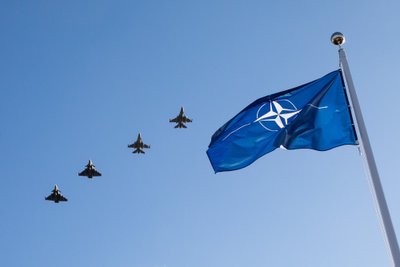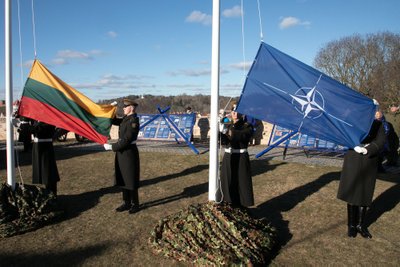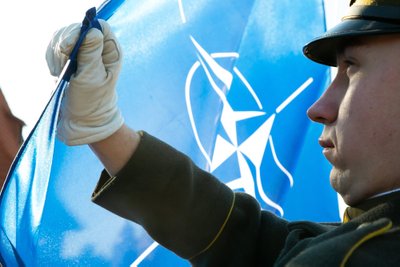Safety and security as a top priority
As stated on the official website of the Ministry of National Defence of the Republic of Lithuania, the North Atlantic Treaty Organization, abbreviated NATO, was established in 1949. This international organization is made up of European and North American nations united to ensure the freedom and security of all members of the Alliance through political and military means. Namely security was identified as a key priority and need by most young Lithuanians when asked why the country’s membership in NATO is so significant for them as citizens of Lithuania.
“I’m not going to say anything new. Lithuania’s membership in NATO gives a sense of security which is of great importance in these most troubled times,” said a young woman.
“I see the NATO membership as a key to the security of Lithuania. Being a young individual, I can hardly imagine where Lithuania could be today if it had not joined the Alliance 20 years ago,” said another respondent.

She acknowledges that nowadays this thought often comes to mind.
“When the world is shaken by compounding crises, and some of them are taking place not far away from us, it is just normal that everybody thinks of the security of Lithuania. I and those from my environment are by no means an exception,” explains the woman.
Her opinion is shared by one more respondent who also stressed the importance of Lithuania’s membership in NATO.
“Until very recently, the country’s membership in NATO was not regarded as something really special. However, after the full-scale invasion that was started almost in our neighbourhood, the attitude to this fact has changed. Knowing that my country is a member of NATO I feel more secure, I have a feeling that we are not alone, that we are surrounded by powerful and united member states that are prepared to help. At least there is a hope that they will act accordingly and this belief lessens the concern regarding the security of Lithuania. This conviction is of utmost importance when reasons for concern are numerous. It can calm down and improve emotional well-being,” elaborated the woman.

According to the information provided by the Ministry of National Defence, although NATO’s core objectives remain threefold: collective defence, crisis management and security of cooperation, collective defence is of particular importance to Lithuania. Primarily because of Russia’s growing capabilities and threats, as we have a border with Russia (Kaliningrad) and Belarus that is becoming increasingly dependent on Russia. It is thus obvious why the need to strengthen and improve defence capabilities is seen as a particular objective of Lithuania and the Alliance as a whole.
Walking a long way in cooperating with the Allies
As stated by the Ministry of National Defence, after Lithuania decided on NATO membership, the country has been purposefully seeking to become a member of the Alliance for more than 10 years through reforms and other actions necessary for membership. Indeed, the path towards the goal was not a smooth one.
Since 2004, Lithuania has come a long way in cooperating with the Allies of the Alliance. As new challenges and opportunities arose, the Alliance, as well as the Lithuanian National Defence System, adapted over time, reads the information on the Ministry’s website.

As stated in the legal framework related to Lithuania’s NATO membership provided on the website of the Ministry of Foreign Affairs of the Republic of Lithuania, Lithuania’s membership in NATO is based upon the provision set forth in the Constitution of the Republic of Lithuania: “to guarantee the security and independence of the country, the welfare of the citizens and their fundamental rights and liberties”. The Law on the Basics of National Security provides that the State ensures national security via integration into NATO and as a full-fledged member actively taking part in the organization‘s work, also that Lithuania‘s membership in NATO is aimed at improving confidence, stability and security in the region and in all of Europe.
As is emphasized by the Ministry of Foreign Affairs, the Republic of Lithuania adheres to NATO and the EU’s indivisible security policy: a threat to the security of a NATO or EU member state is also a threat to the national security of the Republic of Lithuania. The tasks of implementing the national security policy comprise three pillars: state defence, the resilience of the state and its citizens, and international security systems that are in line with the interests of the Republic of Lithuania.

